I had a wonderful childhood. I could never truly put into words how beautiful it was to spend my days (especially those long summer ones) in the company of my grandparents. Mom and dad were always very busy, so it was my grandparents who shaped me the most during those early years of life.
Time passed, though, and almost without noticing, I found myself a grown man. With a wife, kids, and aging parents. With problems, struggles, and constant worries about an uncertain future. In fact, it was those very worries that pushed me into becoming a prepper. Still, the years didn’t just pass for me.
First, grandma was gone, at the age of 80. Not long after, my grandfather followed. My role model of masculinity, my example of resilience… When my grandfather passed away, I couldn’t bring myself to visit his old house for years. The memories were too raw.
But the day I finally stepped inside, I discovered something that changed the way I look at survival forever: my grandpa was a prepper. Stick with me and I’ll show you how I came to that conclusion and the powerful lessons I learned from him.
The First Signs
One weekend, just a few weeks after my grandfather had passed, I finally gathered the courage to take my family back to the old house. I hadn’t set foot there in many years. The place looked exactly as you’d expect after years of wind, rain, and minimal maintenance.
The old shed’s walls showed weathering and the yard had grown wild with weeds, but something caught my eye immediately. What those worn boards and weathered doors revealed became my first real clue into grandpa’s mindset: he built everything to outlast whatever crisis might come.
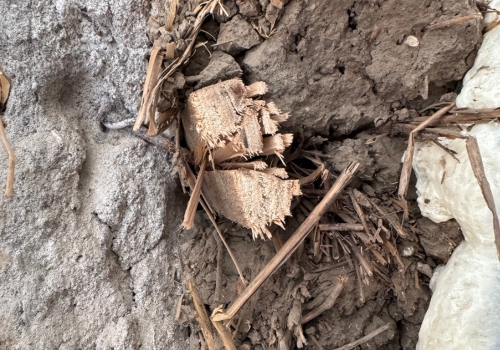
Standing there, I realized how much wisdom was embedded in his approach to self-reliance. If you’re looking to build that same level of preparedness into your own life, this book shows you exactly how to create essential systems that work when everything else fails—just like grandpa’s structures that still stood strong after all those years.
Even decades later, his construction choices spoke of a man who planned beyond the next pay-check. He planned for the next generation. That’s when I understood the true value of creating a completely self-sufficient setup on your property.
Built to Last
When I examined the shed walls closely, I found something that would make any modern prepper nod in approval. Grandpa had rejected flimsy modern materials entirely. Instead, he’d crafted these walls from clay and straw—materials he could source right from his own land—then sealed everything with homemade plaster.
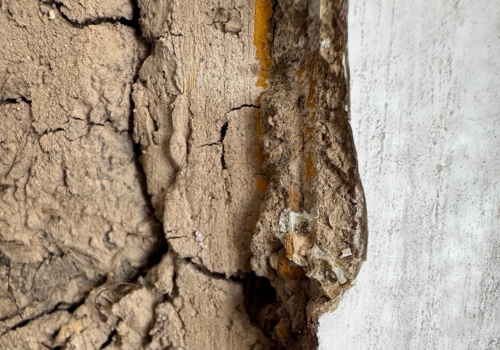
Decades had passed, and while the surface showed cracks and peeling in places, the core structure remained rock-solid. This wasn’t some weekend DIY project meant to last until the next home improvement trend.
Grandpa had engineered this for the long haul, using techniques that allowed easy repairs with materials any rural property owner could gather or make themselves.
Here stood my first concrete proof that grandpa thought like a true prepper. He didn’t trust mass-produced solutions that would fail when supply chains broke down. He built with nature’s materials, planned for permanence, and designed for field repairs.
Even in something as simple as a shed wall, I could see his survival philosophy: make it strong, make it last, and make sure you can fix it yourself when the hardware store isn’t an option.
The Workshop of a Survivor
If the shed walls proved grandpa built for permanence, his workshop revealed an even more crucial prepper truth: he’d achieved complete mechanical independence.
Corrugated metal tiles covered the ceiling—practical, bulletproof, and nearly maintenance-free for decades.
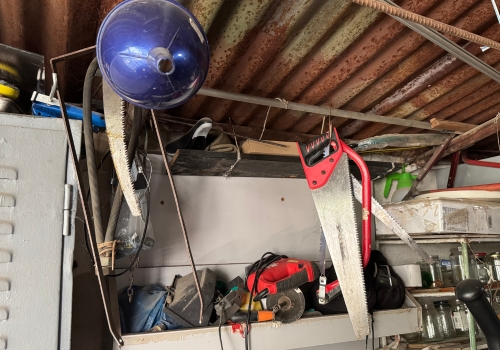
Below, a massive three-compartment metal cabinet dominated the space, built to military specifications and designed to outlast several lifetimes.
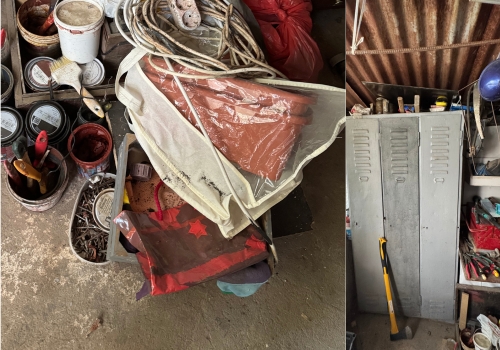
I inventoried the contents like I was cataloging survival gear: extension cords for electrical work, an angle grinder for metal fabrication, precision pliers, multiple screwdrivers, hammers for construction, a splitting axe for firewood, and a sharp handsaw for lumber work.
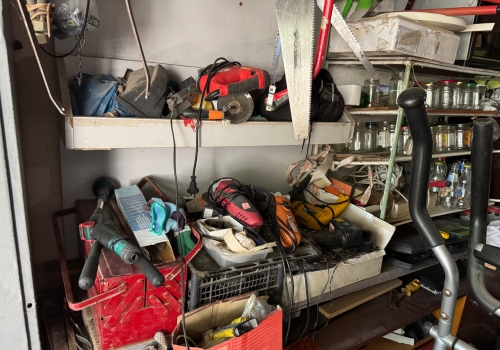
Paint cans lined the shelves alongside glass jars sorted by fastener type. Every nail, screw, and bolt organized for instant access. Stacks of seasoned wood pieces waited nearby for the next repair project.
Most people would dismiss this as an old man’s cluttered workspace. I recognized it as a complete self-reliance system. Grandpa never waited for repair services or hardware store hours. He maintained the tools and materials to solve any problem immediately, using his own hands and skills.
This embodies core prepper philosophy: redundant tools, forward-thinking material stockpiles, and the expertise to transform scraps into solutions. When supply chains collapse and service calls become impossible, a workshop like grandpa’s transforms from hobby space into survival headquarters.
But having the tools and materials is only half the equation. The other half is knowing how to secure your home, stretch your food supplies, and maintain the mental fortitude to lead your family through extended crisis periods.
That’s where A Navy SEAL’s Bug-In Guide becomes invaluable (at least for me)—it teaches you the tactical mindset and practical skills for food stockpiling, home defense, strategic meal planning, and building the mental resilience that separates survivors from victims when you’re forced to hunker down and wait out the storm.
The Cellar
Now for the crown jewel of grandpa’s prepping operation. He’d constructed this cellar using the same clay-and-plaster technique as the shed. Traditional methods designed to preserve food for generations without electricity or modern refrigeration.
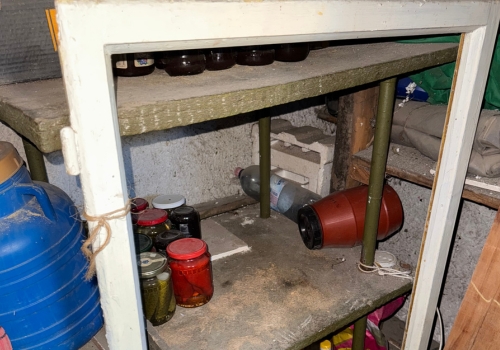
The shelves displayed what looked like a professional food preservation operation: rows of sealed mason jars containing pickled vegetables, tomato juice, and preserved fruits, all maintaining their color and integrity after years of storage. He used honey to preserve foods because he knew its high sugar content prevents bacteria from growing.
He buried onions in sand because he knew it could absorb moisture and prevent onions from sprouting or rotting. Most of these techniques have been lost to history, but you can still find the most important ones in The Lost Superfoods book.
A rusty padlock secured one corner section—clearly his most valuable supplies.
Water-resistant gear filled the remaining spaces: quality hoses, metal funnels, and protective clothing.
Large blue barrels occupied strategic positions, obviously intended for bulk water or grain storage. The centerpiece caught my attention immediately: a wooden cask housing a metal container with an attached spigot.
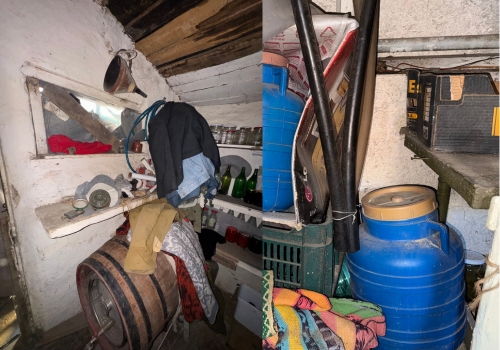
Based on the underground location and professional setup, I believe grandpa used this for long-term water storage, keeping his family’s most critical resource cool, protected, and accessible.
As you can see, he never stored his water stockpile next to a fence. That’s because wooden fences, treated posts, or even painted metal fences can leach chemicals into nearby soil and containers when it rains. Over time, that can contaminate water stored in plastic or metal barrels.
Another reason is that fences also tend to attract pests looking for shade and shelter, which can chew through or infest storage containers. Lastly, a water stockpile placed against a fence is easy to spot from outside, making it vulnerable to thieves or looters.
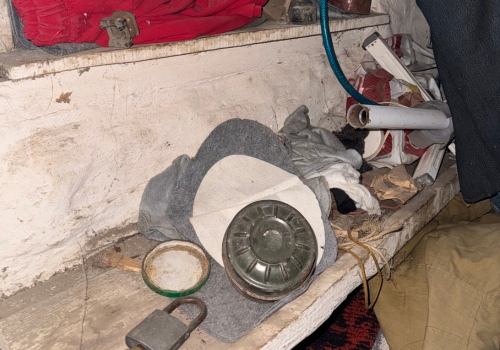
The setup impressed me not just for its contents, but for its underlying strategy. Grandpa understood that grocery stores and modern distribution systems represent fragile links in the survival chain. He’d invested in time-tested preservation methods: glass containers, wooden barrels, and underground storage that would function regardless of power grid status.
This cellar provided genuine insurance against food shortages, supply disruptions, and economic collapse.
Interestingly, the cellar’s structure reminded me very much of what I managed to assemble at my own home.
I created an underground bunker where I keep my most important supplies. Why underground?
Because, just like grandpa, I wanted to have a proper space for food provisions and other objects I might need, but also a place where I could take shelter in case SHTF.
I’ve been using this space for 5 years now, and it was excellent even during COVID times. I stored all my provisions there, also gaining space in the house.
I assembled it myself and it cost me around $400, including the materials and the plans I bought from here.
The Livestock Operation
The final piece of grandpa’s survival puzzle triggered a flood of childhood memories. I remembered how seriously my grandparents managed their chicken flock. Gosh, these birds weren’t pets or a hobby…
They formed the backbone of the family’s protein security, delivering fresh eggs daily and meat when needed.
Walking through the backyard, I rediscovered their chicken shelter. Grandpa had welded a sturdy metal frame, now showing honest rust from decades of weather exposure.
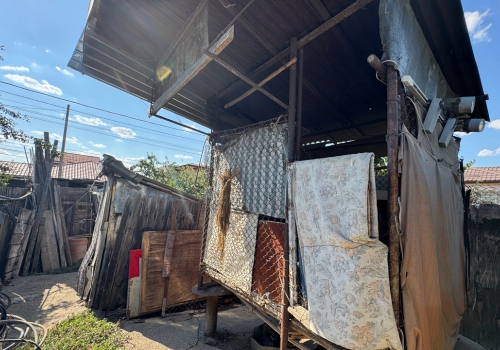
He’d engineered the entire structure on legs, elevating it above the concrete pad. That was a deliberate design choice that protected his flock from ground moisture, predators, and disease transmission.
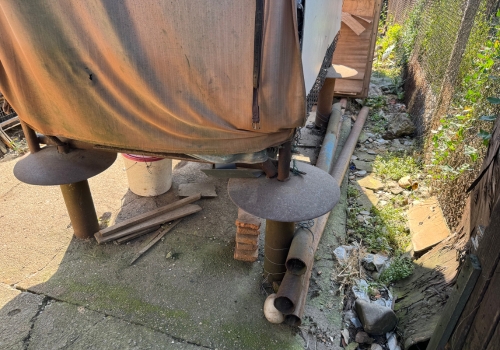
Time had weathered the frame and stripped away the paint, leaving the structure tired but intact. Even in decay, it demonstrated sound livestock management principles that many modern preppers would recognize and respect.
This simple shelter proved that my grandparents grasped what many Americans have forgotten: genuine food security starts in your own backyard. Those chickens represented their daily insurance policy against hunger and their living reminder that true independence comes with feathers, claws, and a steady supply of fresh protein.
The sight brought both warmth and regret. Decades had passed since those birds provided for the family, but the shelter stood as permanent proof that real survival depends on the practical, proven methods our grandparents practiced every single day.
I don’t want to be unfair and accuse all Americans of no longer using these methods. There are still preppers, homesteaders, and even entire communities of people who raise animals in their own backyard. Personally, I’ve always admired those in the Amish community…
They are true masters in raising chickens and preserving the eggs they can produce. Reading The Amish Ways Book, I was very impressed by the part that explains why the Amish keep eggs covered in salt.
Final Thoughts
My grandparents survived genuine hardships. They endured wars, rationing, and shortages that most modern Americans can barely imagine. As a child, I spent countless hours exploring every corner of these spaces—the workshop, cellar, livestock areas, and surrounding land. But somewhere along the way, I lost sight of their lessons.
I forgot the practical wisdom my grandfather demonstrated every day, not through lectures, but through his deliberate choices about how to build, preserve, and prepare. Maybe I should have listened more carefully. Maybe I should have learned these skills while he could still teach them. But it’s never too late to honor his example.
Even after he’s gone, grandpa managed to show me what old-school American self-reliance actually looks like in practice. His methods weren’t complicated or expensive, but they were proven, practical, and sustainable.
For that lesson, I can only feel grateful. I’m grateful I finally returned to walk through those spaces again and rediscovered what I’d once forgotten.
And yes! That wooden barrel from his cellar will soon hold water in my own basement storage room. A piece of my grandfather’s self-reliant spirit will continue serving the next generation, exactly where it belongs.
I really appreciated that my grandparents were even interested in water stockpiling. But to be honest, my choice is a bit more modern… I decided to invest in the U.S. Military’s secret plans, specifically The Water Freedom System. Also, for bugging out, I recommend this extremely clever product called The Water Smart Box. Give both of them a try!
You may also like:
My Grandfather is a WWII Vet. Here is What He Taught Me!
Save Money You Pay on Medicine with This (Video)
15 Modern Laws That Would Get Our Grandfathers Arrested
How Your Grandfather Celebrated the 4th of July 100 Years Ago (1918)

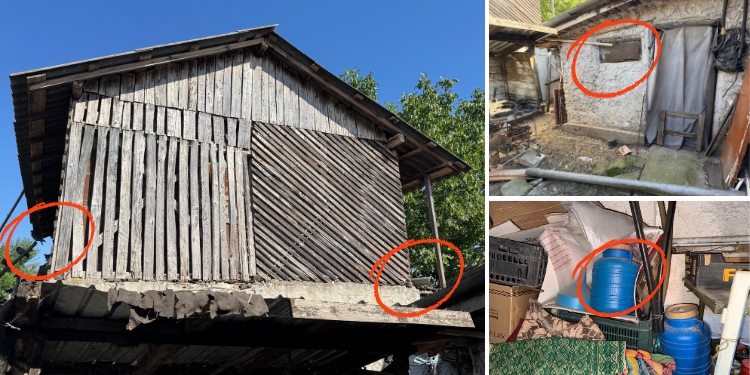

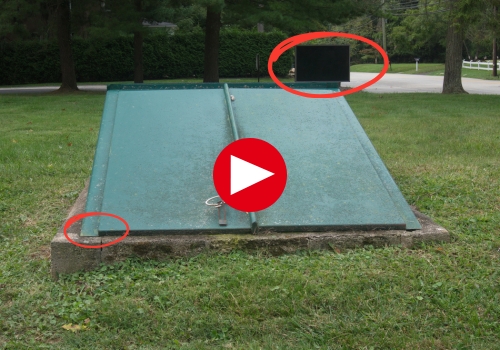
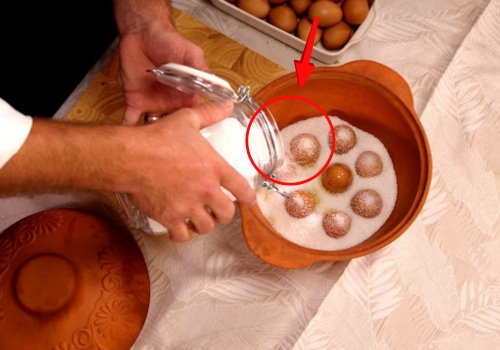







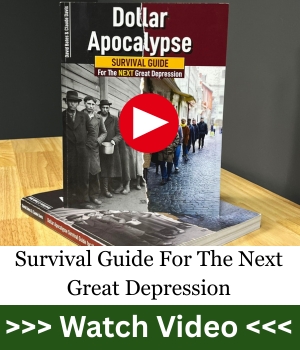



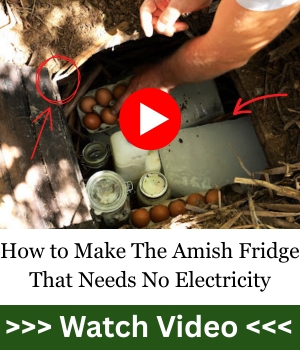








I will write the unpopular thing. Prepping currently is trending toward “romanticizing being poor in the past” versus true long term self sufficient living. Life in the past was hard and people did what they had to to survive; that is commendable. That does not elevate “hillbilly engineering” to “self sufficient homesteading”. You should strive toward quality and finished systems design that are functional and professional. Think “Yellowstone”, “Amish Farm” not “Mad Max”, “Junkyard Palace”. I have the ability to do amazing feats of “hillbilly engineering” and occasionally resort to those parameters to get something back running ASAP but that is not the end goal today. The end goal is to create and maintain self-sufficiency in a prosperous and comfortable (even proud) manner. Put in the effort to build a finished chicken coop, a professional quality root cellar, a code compliant well engineered local fuel sourced heating system, and an elegant water system (not a wooden barrel in a basement). Save the cobbling together solutions until after the fall when scrounging is the only option. For all the fixed income, medicines are expensive, and I can’t do heavy work reply comments that will come, focus on the two week storm caused power outage event prepping versus the end of society event you will not survive.
Exactly! Great way to say what many of us are thinking.
Rough and quick is good in a pinch later, but today, we have some time to properly prepare and BE self sufficient .. wish there was a collection, or even individual Solutions that were more hearty, more strong and long lasting, more elegant in design and build. POWER problems and EMP seems the mostly like challenge. I’d like to buy and read more about how to build longer lasting hearty energy systems and efficiencies to make that power last longer from lithium batteries or Solar / Wind / Water generation. Renewables are way cooler. Wood burning stoves, copper water heating, vehicles that run on other things and Bugging IN at what you already know and have are much more interesting and entertaining — spreading Great Solutions for intelligent readers. Keep up the good start, now update it with modern times, modern options, life isn’t over yet, what are the best solutions available today? What does that look like? Sells me.
Midwest Farmers and Engineers unite
EJ, sounds like your just talking about every day life in a mid west farm.
Please check into what happens with an EMP strike. The MODERN grid goes down, the world will run on a backup generator, MAYBE, to get it re started. You CANT start the grid without heavy, stable electricity with which to start generation ( you must match the wave- if you dont understand what wave, time to look into it, and get very scared) A cascade of power crashing is a real danger, followed IMMEDIATLY by dysentery in every CITY. On that mid west farm, get ANOTHER thousand gal. of fuel, alternate which source you use to keep fresh. OLDER gas and diesel will run after an EMP. Better have a couple old gassers around, to jump the diesel ( it gets cold). Farm = ways to make that root cellar a BIG one.
Burry an old section of vertical silo, in a good place, with french drain. 2 silo rings, with insulation between them, in the back 40, good drainage, roof, hidden by woods, you have the place to bug too. You can have the farm put up wind, old fashioned, 12 volt, easy to maintain. Another to pump water.
E J, Now you have touched the juxtaposition of self-sufficiency and technology. How to combine 1888, 1926, and 2025 into a single life style. First example is a parallel electrical system, a 240/120 VAC traditional systems and a 12V system in each structure. Use self-sourced 12V system (solar, wind, hydro, battery) for daily loads (lighting, entertainment, communications) and the gird / inverter backed up / generator backed up 240/120 VAC system for heavy loads (cloths washing, well pumps, HAVC, shop power). Research and seek alternatives to eliminate or mitigate heavy electrical loads. Examples; a heat conducting fire place (pretty and functional), exterior boiler systems for heat and hot water, or even a back up clothes line in the yard. Then comes the “dream items” such as a “steam engine generator” to charge your battery bank when the solar and wind cannot keep up or power the inverter on “heavy chore day”! If you have an old school way to generate power (steam engine generator /alternator) do you choose to purchase modern electric vehicles to self charge (combine 1888 with 2025)? You quickly join Alice down the rabbit hole when you start mapping it all out on paper!
There’s definitely a difference between making do with scraps in desperation versus building systems that are reliable, efficient, and dignified. I think what stood out to me about my grandpa wasn’t so much the “rough edges,” but the fact that he built things to last, with what he had.
That mindset is what I think preppers today can learn from, while still aiming for the quality and permanence you described — a professional chicken coop, a solid root cellar, a well-designed water system.
I agree 100% that we shouldn’t romanticize poverty, but rather take the lessons of resilience and apply them to create something sustainable and comfortable for the long haul.
Caleb,Thank-you for the original story, the reply, and be assured this is a discussion not an argument nor attack. My farm has six generations of work on it (Great Grandma to my grand-kids) of which I am the third generation owner. I understand and also commend the “resiliency” and “building things to last with what they had” abilities of my predecessors particularly when I have to dismantle those things my Grandfather built (sledges and jack hammers!) to replace them with systems that are “sustainable and comfortable for the long haul” along with pleasing to my wife’s desired image for “her” (I sometimes thing she only married me for the farm!) homestead! ;-D
I couldn’t bring myself to visit grandfathers house FOR YEARS. One weekend, just a few weeks after he died, I took my children. Umm ?
its like this, that generation had the great depression, on top of being raised in rural America, even Urban America was RURARL back then. You NEVER just went to the store, just pick up the phone, just wave your arms and someone else will do it – was just not a way of life.
My generation, we were all exposed to the RIGHT way to live. We just had plans to live better, with a lot more MONEY and so we didnt have the need. Then Life happened, and we have the need. then prepping was born. Now here is where the road splits –
Road A , we are already prepped for 2 weeks without power, and if its localized, 2 months without power ( easy to re supply, even buy a second and third generator)
Road B , we realize, the world is under attack. People that know more than we do, want us as subjects, not citizens. The lengths they will go to in order to achieve this goal, may just kill us all.
If you followed my other posts, I talked about 4 levels of prep, weekend, a month, a year, THREE years and beyond.
We need another level, sort of level THREE B , After a year, our government and society re boot and move on. With Luck, this is the worst that might ever happen.
we had an article about condoms, so here goes. that’s the usual first time any of us preps. So ask yourself, is it better to NOT prep, or, to prep too much ? When your 16 and you dont do any preps, your children pay for it their entire life . . .
When your 30 and you dont do any preps, your children MIGHT save you.
Personally, I miss a book we had in 6 or 7th grade, Colonial life on the FARM, even taught about bridge building. Mostly, a guide on how to carve out a world, with an Axe, knife, shovel, and a wet stone or any flat one near the creek.
I would recommend “Five Acres and Independence” as the book from my childhood. Focusing on the self-sufficiency does the majority of the design and build then include the low power usage and alternative fuel methods as primary or parallel or back-up systems to modern systems based on your choices to cover the “prepping” aspects. A functional, professional, and pleasing homestead can be a wonderful life lived that will serve you well if bad things where to ever occur. I would also recommend more than five acres but that is a personal choice.
Kre
Is that the right name for that book? I looked it up and there isn’t one named exactly that. There are a couple but curious if this is the name?
Please, let me clarify. My grandfather hadn’t been living in that old house for quite some time before he passed, as he wasn’t in good condition. It had been sitting there, mostly untouched, which is why going back was so emotional and surreal.
And you’re right — that generation had a whole different relationship with survival. For them, it wasn’t “prepping,” it was just life. I like how you framed the different “roads” and levels of preparedness. That’s exactly why I believe we need to take their lessons and adapt them, whether it’s prepping for a two-week storm outage or for something much bigger. Better to be “too prepared” than not prepared at all.
Howdy from high in the desert swamp,
I stayed with my grandparents a lot when I was a kid into my middle teens. 60s into mid 70s. They had been married about six months when the depression hit. Both of them were very thrifty. Which when I was a kid, I thought was funny because I thought they were cheap. Come to find out, they lived the lifestyle of repurposing. I remember asking one time why don’t you just go to the store? My grandpa looked at me and was puzzled. He didn’t answer me and later I asked him again and he said I didn’t know how to answer you. Why go to the store when I have things here? I had been sent to the barn many times to come back with a piece of fence post or a string of barb wire or the coffee can full of nails. Watching him make an ax handle looking back is a very cool memory. It wasn’t that they were cheap. They just reused what they had. Town was 9 miles away. It was 2 miles on a gravel road before we got to the blacktop. The Missouri Ozarks are at the end of the road and turn right and go another 5 miles lol. If it wasn’t for Whiteman Air Force Base flying over with fighter jets setting off sonic booms we never heard anything but nature. There were times we tore down a chicken coop and reused the wire, and whatever boards hadn’t been poop rotted were reused. None of what was used was new. But what was built was solid and adequate. We had a goat that had injured itself when it was growing and split one horn. It made it look like he had three. He scared the little kids and the other animals. The bull was in a stall in the barn and the goat jumped up and put his feet over the wall and looked in and scared the bull. He ran through the side of the barn. He’s on record still is the biggest black Angus bull in Missouri. He went wherever he wanted to. I thought it was the funniest thing I had ever seen. That was a big hole in the side of the barn. My grandpa stared at it for a minute, went and got his saw and cleaned the sharp edges off of the boards and left it. He said he had been thinking about putting a door back there there because he was tired of walking all the way around. That hole never got fixed. And it did make the trip much shorter to go through the barn rather than around to the one front door. I would do some little stuff and he would tell me I would’ve made a good hobo. I really didn’t know exactly what that was but it wasn’t an insult. So I asked what would a hobo do without a fishing rod? He didn’t make one right then, but he told me they would take a piece of old chair or a stick and wrap bailing string around it with a hook and use that tossed out into the water and wound back up. Several years later, we were cleaning out the feed room and I found it and he time traveled holding onto that. He looked at me and goes. I didn’t remember having this. And he just looked off. I never got to use it. But I didn’t forget. I made me one last year before Christmas and I caught a 3 pound bass on it. So I made two more and gave them away as Christmas presents. One guy really appreciated it and told me he’s used it and the other guy didn’t. He really didn’t know what to make of it. Looking back at my grandparents I think about them when I’m doing something and realize I’m doing it because they did it. Why buy biscuits when I can make them. Why Why buy smoking wood when I can get it myself down the road. Why buy sausage when I can grind it myself. All kinds of things that add up to having skills and the ability to make do with what you got. Mud walls, trenches dug instead of fence. Cows won’t jump across that. This was an interesting article and it led me down nostalgia lane. I too looked through a lot of their stuff after they had passed away. Thanks for a really interesting article.
Remember The Alamo
Remember 9/11
Remember North Carolina
Remember to have your soul prepared
That was a fantastic read! Thank you for sharing it. Your memories really brought to life the same kind of lessons I felt when revisiting my grandpa’s place. I love how your grandfather turned a bull-sized hole in the barn into a “new door” rather than a disaster — that kind of practical, flexible mindset is priceless.
This was great information.
I have not been on this site for some time to really stop and read it.
But this really really got my attension .
Trump is doing his best to get this country back on its feet.
There is all ready .bitchin . but for all the damage Biden did.
Its going to take time.
There already dumping the dollar around the world .
And if it continues.
Prices are going to go up.
So this is great information.
Keep that information coming..
I would like to say thank you all for sharing your knowlage .
If it its the fan .
will need this info.
I think we will see Billionairs become millionaiers and middle class be come the new poor.
So this is why this info you put on here will be so helpful to many
Thank you
Larry Grenie/Igor
Thank you, Larry. You’re absolutely right that we’re heading into uncertain times, and no matter what side of the political fence someone stands on, the truth is prices are rising and the dollar is under pressure worldwide.
Prepping has never been about panic. It’s about taking responsibility for our own future when systems we depend on become unstable.
I appreciate your encouragement, and I agree with you — information sharing in communities like this one is going to be what keeps families safe and steady when things really do “hit the fan.”
I would like to share a a bit of my child hood with you all.
I grew up on a 150 acre farm.
We milked 40 cows., And all the other animals that go with farming
But we were not rich.
Lived in a 5 bedroom house
Near Five Points Wisconsin.
Looking back.
it was good and life was not always easy.
But we never went hungery ..
Even would walk 5 miles to go fishing .
Starting out early in the morning.
And another place only a mile.
Road our bike to go see our friends,
But before we had bikes , we had to walk.
Looking back. I think life was better then , then it is to day.
And people have really changed over this many year , but so has the world.
I do not look at it to day as better times.
The problem. To much greed. not enough trust., and respeck for your fellow man
Its how much can I get,( Moral ) Where did they go
That’s a beautiful memory, thank you for sharing it. You hit on something powerful: life wasn’t always easy, but it was solid.
The strange thing would have been if he weren’t a prepper, without romanticizing the lives of our grandparents, in their time there were shortages and many families depended on their skills to avoid starving! It’s also true that we’ve become softer, you can choose the origin of the chocolate you want to give for Valentine’s Day, our grandparents didn’t have those opportunities, that’s why we’re surprised that their tools were durable! They didn’t have second chances. They also didn’t have the amount of regulations we have today, any twelve-year-old boy could buy a .22 caliber rifle and practice in his backyard, nobody would be scandalized by that, today that is unthinkable,